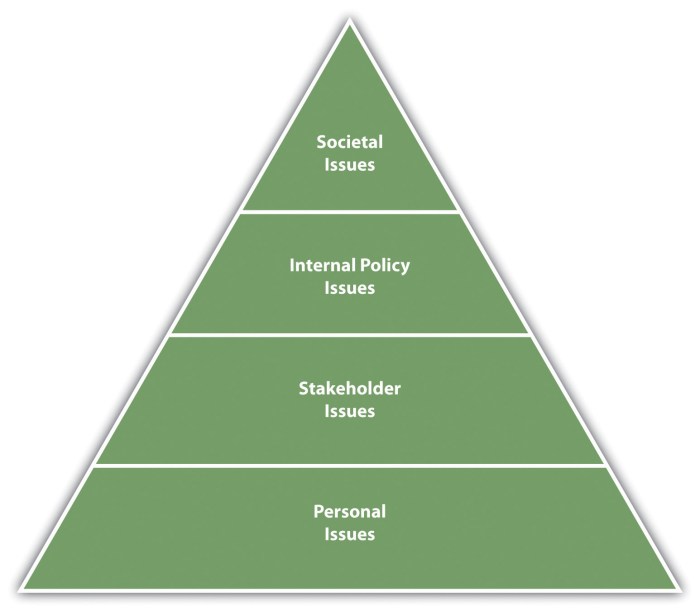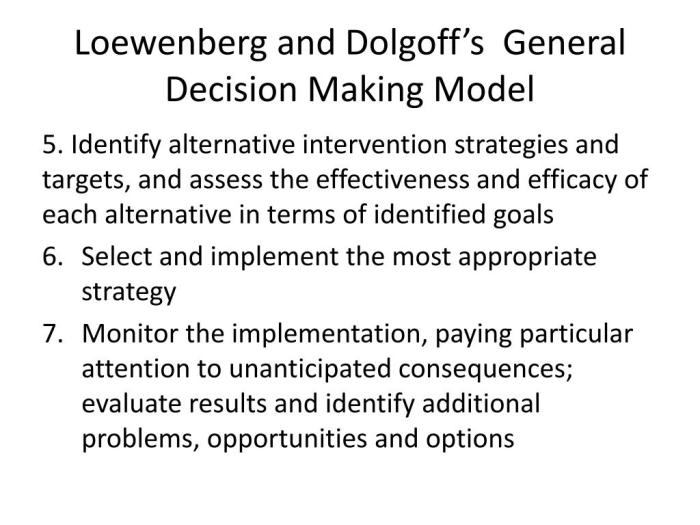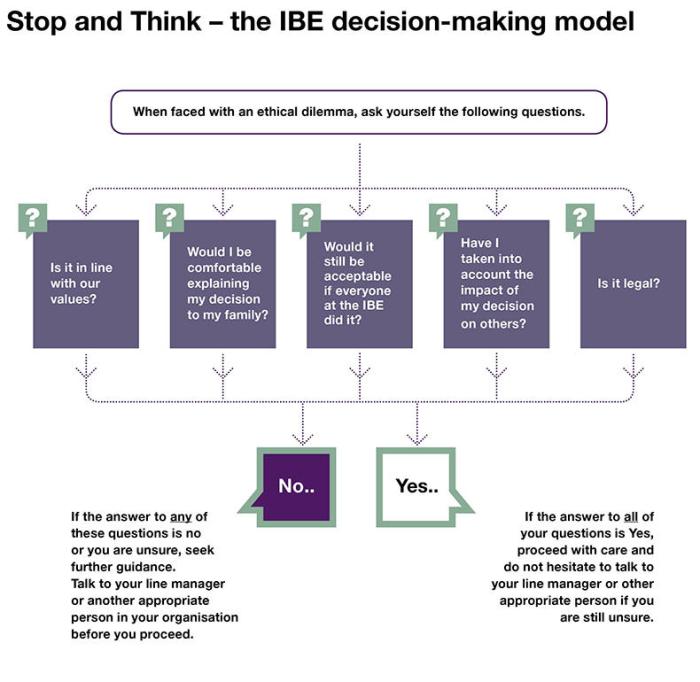Dolgoff ethical decision making model – The Dolgoff Ethical Decision-Making Model, a renowned framework for ethical decision-making, provides a structured and principled approach to navigating complex ethical dilemmas. Developed by Ralph Dolgoff, this model has gained widespread recognition for its effectiveness in various fields, including healthcare, business, and personal life.
This comprehensive guide delves into the intricacies of the Dolgoff Ethical Decision-Making Model, exploring its principles, steps, applications, strengths, limitations, and ethical considerations. By understanding the nuances of this model, individuals and organizations can enhance their ethical decision-making capabilities, leading to more responsible and values-driven outcomes.
1. Definition and Overview of the Dolgoff Ethical Decision-Making Model: Dolgoff Ethical Decision Making Model
The Dolgoff Ethical Decision-Making Model is a systematic framework designed to guide individuals in making ethical decisions. It was developed by Ralph Dolgoff in the 1980s as a tool for healthcare professionals to navigate complex ethical dilemmas. The model emphasizes the importance of considering multiple perspectives, weighing values, and assessing consequences to make ethically sound decisions.
2. Steps and Procedures of the Model

The Dolgoff Ethical Decision-Making Model involves several sequential steps:
- Identify the Ethical Issue:Determine the ethical dilemma or conflict that needs to be addressed.
- Gather Relevant Information:Collect facts, data, and perspectives from various sources to gain a comprehensive understanding of the situation.
- Consider Different Perspectives:Examine the ethical issue from multiple viewpoints, including those of stakeholders, healthcare professionals, and society.
- Weigh Values:Identify the relevant ethical principles and values involved and assess their importance in the decision-making process.
- Consider Consequences:Analyze the potential outcomes of different decisions and their impact on individuals, society, and the environment.
- Make an Ethical Decision:Based on the analysis and weighing of values and consequences, make an ethical decision that is justified and defensible.
3. Application of the Model in Different Contexts
The Dolgoff Ethical Decision-Making Model is applicable in various fields and situations beyond healthcare, including:
- Business:Navigating ethical challenges in corporate decision-making, such as environmental sustainability, employee rights, and financial integrity.
- Personal Life:Making ethical choices in personal relationships, financial decisions, and lifestyle choices.
- Education:Guiding students in resolving ethical dilemmas in academic and research settings.
4. Strengths and Limitations of the Model

Strengths:
- Provides a structured and systematic approach to ethical decision-making.
- Encourages the consideration of multiple perspectives and values.
- Facilitates the analysis of potential consequences and outcomes.
- Promotes ethical accountability and transparency in decision-making.
Limitations:
- Can be time-consuming and resource-intensive, especially in complex situations.
- May not always lead to a clear-cut decision, as ethical dilemmas often involve conflicting values and interests.
- Relies on the ethical judgment and values of the decision-maker, which can be subjective.
5. Ethical Considerations and Implications

Using the Dolgoff Ethical Decision-Making Model can help promote ethical behavior and decision-making by:
- Raising awareness of ethical issues and responsibilities.
- Encouraging a thoughtful and systematic approach to decision-making.
- Promoting transparency and accountability in ethical decision-making.
- Facilitating the resolution of ethical conflicts and dilemmas.
However, it is important to note that the model itself does not guarantee ethical decisions. Ethical decision-making ultimately depends on the integrity, values, and judgment of the individuals using the model.
FAQ Corner
What are the key principles of the Dolgoff Ethical Decision-Making Model?
The Dolgoff model emphasizes the importance of identifying ethical issues, gathering relevant information, considering different perspectives, weighing values, and evaluating consequences.
How can the Dolgoff model be applied in healthcare?
In healthcare, the Dolgoff model can assist in making ethical decisions regarding patient care, resource allocation, and end-of-life decisions.
What are the limitations of the Dolgoff model?
One limitation is that the model may not be suitable for all ethical dilemmas, particularly those involving highly complex or subjective issues.